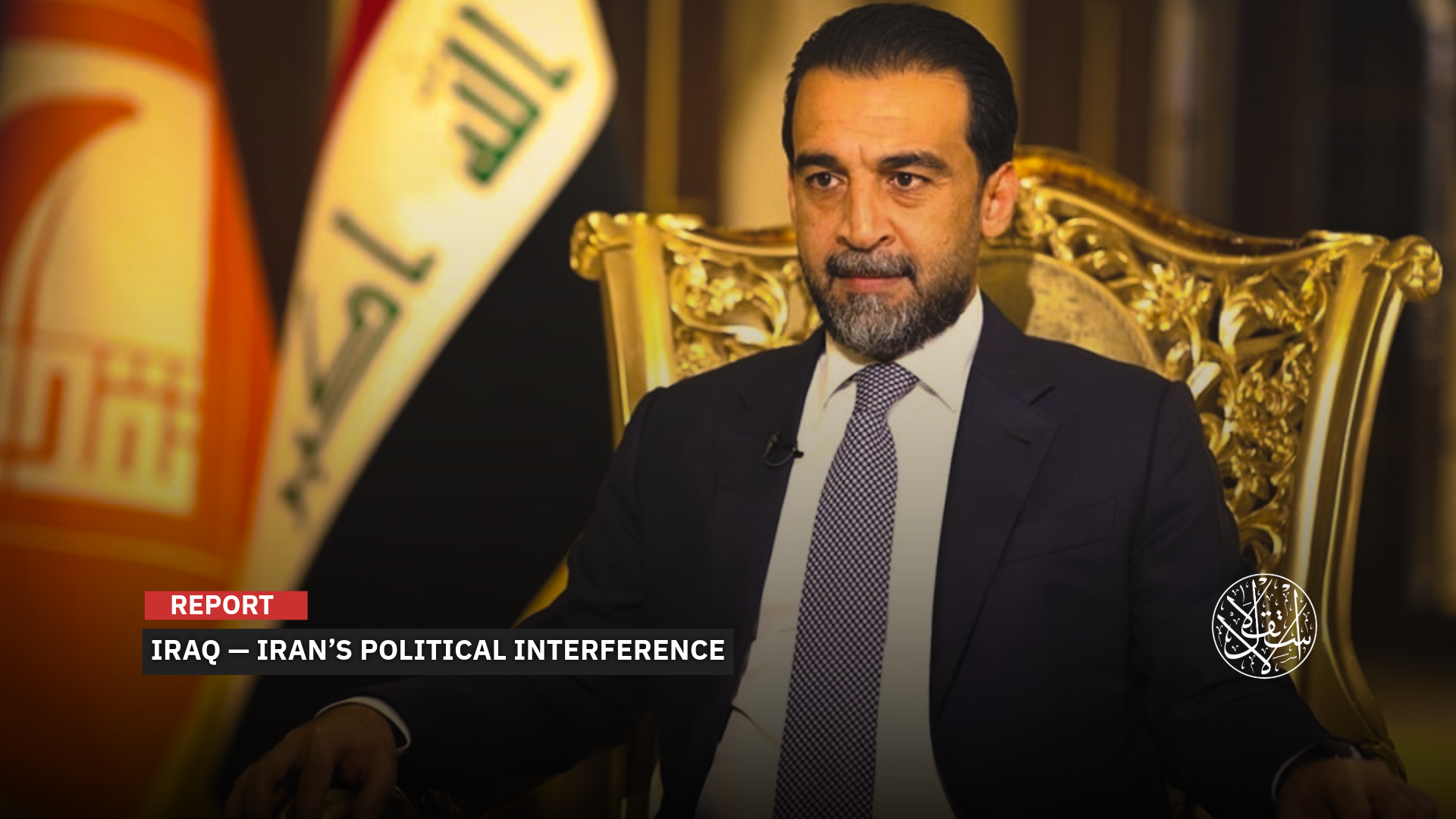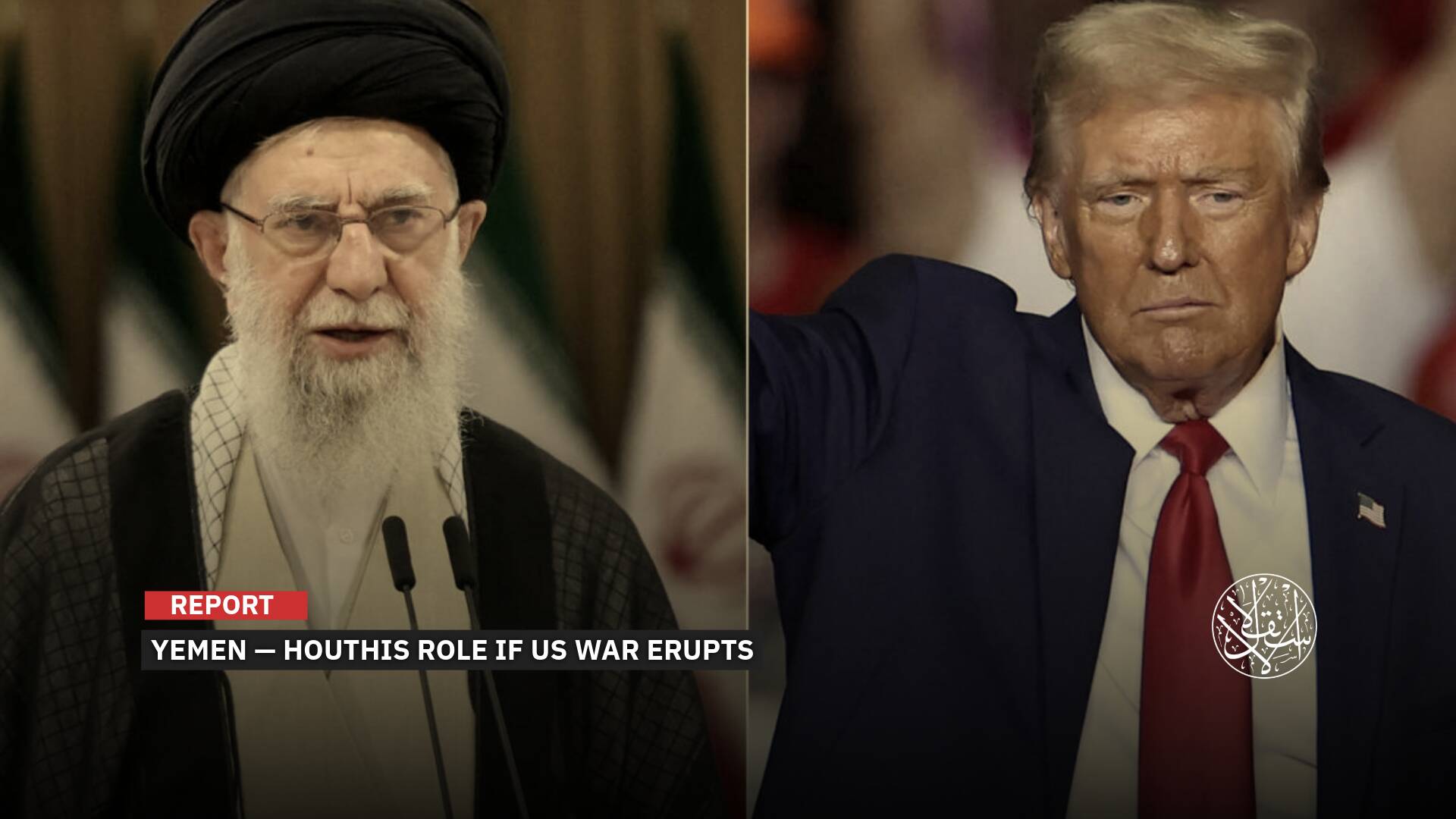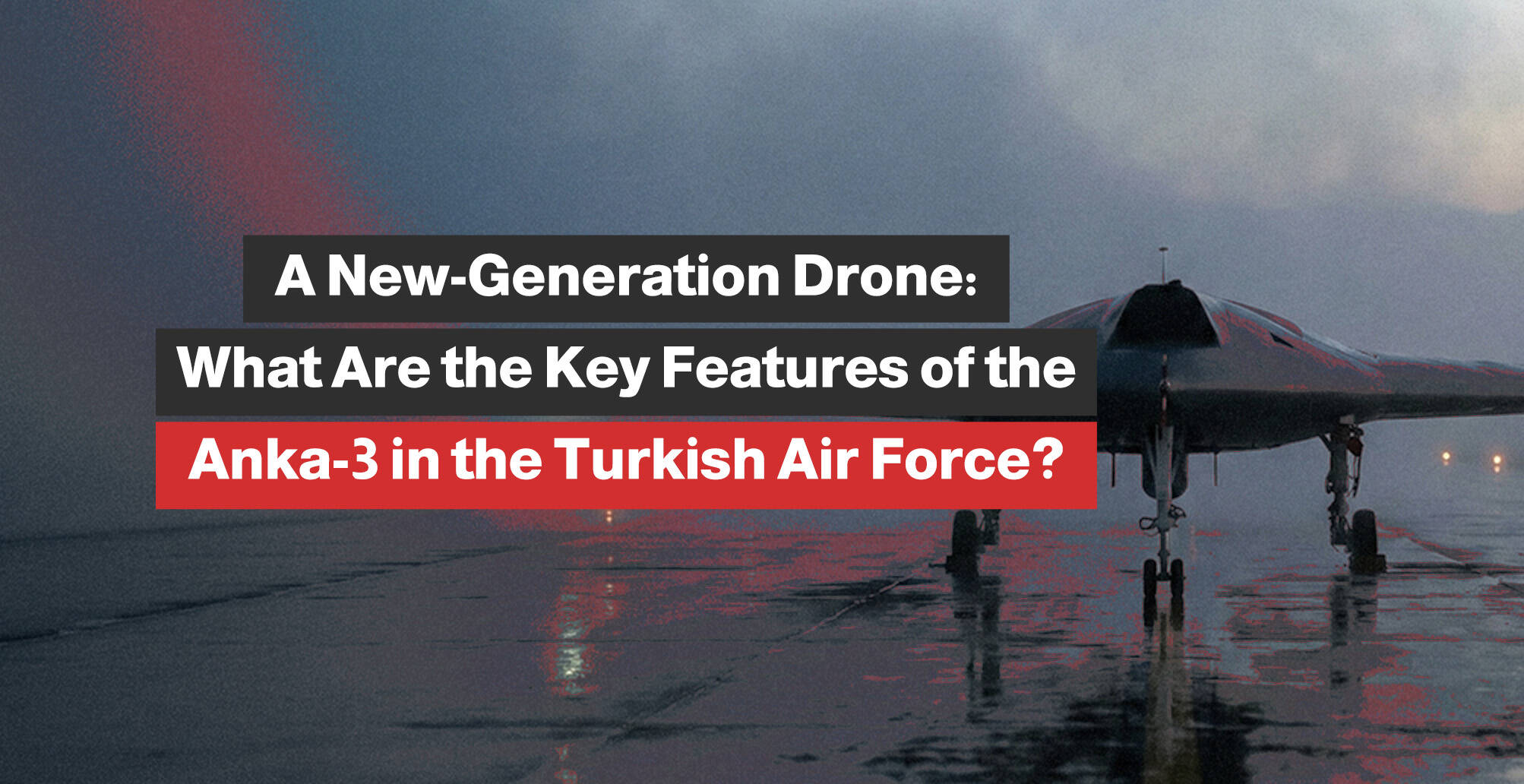Behind Tehran’s Support for al-Halbousi and Its Turn Against Him

Al-Halbousi included his candidates on the Asa’ib militia list in Babil Governorate.
Unlike most Sunni political leaders and electoral lists in Iraq, Mohamed al-Halbousi, head of the National Progress (Taqaddum) Party, and the prominent figures on his list, faced no disqualifications from the election. In fact, accusations from rival Sunni forces suggested that he was the party behind the exclusion of several leading Sunni candidates from other lists.
On October 19, 2025, the Independent High Electoral Commission announced that a total of 837 candidates had been disqualified: 293 due to decisions by the Accountability and Justice Commission (De-Ba'athification), 90 for criminal records or issued judgments, 20 for integrity-related files, and 11 for document forgery, with the remainder excluded for various other reasons.
Militia Support
Iraqi politician Mashan al-Jabouri said that Shiite forces clearly support al-Halbousi’s rise and do not challenge him on any matter, in contrast to the systematic targeting of Iraqi Sovereignty Alliance Leader Khamis al-Khanjar through legal cases and attempts to sideline him, because, according to al-Jabouri, he demonstrates care for the Sunni community and defends its rights.
During a television interview on November 3, al-Jabouri added that the disqualification of his son, Yazan Jiboury (head of the Soqourna Alliance), was driven by Iranian interests but “encouraged by al-Halbousi” due to fear of a young competitor rising in the next phase.
“Any Sunni figure with presence and influence is treated with caution,” he said, noting that several Shia candidates faced confirmed court rulings yet still participated in the elections, while Yazan was excluded even though the case of the leaked audio had been closed by a judicial decision.
Al-Halbousi is accused of sidelining key Sunni figures from the electoral race, including Haider al-Mulla of the Azem Alliance and Rakan al-Jabouri, a former governor of Kirkuk representing the Arab Alliance, as well as several prominent candidates on rival Sunni lists, all of whom were considered nearly guaranteed seats.
During the campaign, public statements from figures linked to Iran-backed armed factions praised al-Halbousi and urged Sunni voters to support him, while warning against voting for the Iraqi Sovereignty Alliance.
In a video circulated on November 6, Imam Ali Brigades leader Abu Azrael explicitly called for voting for al-Halbousi, claiming that he “is not concerned with religious or Islamic identity issues, but rather with dancing and celebrations,” yet he considered him “the most suitable to represent Sunnis,” while accusing Khamis al-Khanjar of having religious and political ties he viewed as “problematic.”
Al-Halbousi is also known to have close ties with Shibl al-Zaydi of the Imam Ali Brigades, who is accused of kidnapping and killing thousands of civilians in Sunni areas. According to Mashan al-Jabouri, al-Zaydi “frequently visits al-Halbousi in Anbar.”
Prominent blogger Ahmed al-Thawaq, known for his closeness to Shiite factions, described al-Halbousi on November 7 as “the Sunni leader in Iraq,” following al-Halbousi’s attack on Kurdistan Democratic Party leader Masoud Barzani.
“As the elections approach, we hear discordant voices from people who arrived by chance or were placed by others, speaking far above their level,” Kurdish leader Hoshyar Zebari posted on X.
“Al-Halbousi is a prime example of this group emboldened by militia alliances and vast corrupt wealth, but what goes up must come down.”
In the November 11 elections, al-Halbousi fielded his candidates in Babil Governorate on the al-Sadiqoun list affiliated with Asa’ib Ahl al-Haq, led by Qais al-Khazali, despite the ongoing occupation of Jurf al-Sakhar by Iran-backed militias and the continued denial of return for its approximately 250,000 Sunni residents since 2014.
This alliance between al-Halbousi and al-Khazali comes even though Jurf al-Sakhar, in northern Babil, remains under the control of Iran-backed militias, which refuse to allow the town’s roughly 250,000 Sunni residents, displaced since 2014, to return, forcing them to live in displacement camps across Iraq.
Without Principles
Commenting on claims that Shiite forces are pushing to reinstall al-Halbousi after his removal from the speakership, Iraqi analyst Latif al-Mahdawi said the backing from the Iranian camp is “overt, deliberate, and continuous—designed to thrust him back into the spotlight.”
“This support hurts only his Sunni rivals, turning him into a powerful instrument for fracturing and weakening the Sunni bloc,” he told Al-Estiklal.
“The confidence al-Halbousi displays at his electoral rallies is not rooted in his own strength but in the political cover he enjoys, especially as he uses a confrontational tone against all rival Sunni forces while repeatedly attacking the Kurdistan Democratic Party in an attempt to appease the Iranian camp.”
The analyst described al-Halbousi as “adventurous, reckless, and opportunistic,” noting that his removal from the parliament presidency following the falsification of a deputy’s dismissal document was merely “a disciplinary signal from his Iran-backed allies after he tried to defy them at a certain stage, using the forgery case as a legal pretext to sideline him.”
“Al-Halbousi has no fixed principles; he is ready to compromise any Sunni entitlement to remain in a leadership position, be seen as the foremost Sunni leader, and continue benefiting from financial and political privileges extracted from Sunni-majority provinces,” he added.
“Al-Halbousi’s ongoing attacks against Kurdish forces, particularly the Kurdistan Democratic Party, send a message of loyalty to Iran and align him with Shiite factions hostile to the Kurdistan Region, which have previously carried out repeated drone and missile attacks on Erbil and other areas.”
As criticism of al-Halbousi surged from both Sunni and Kurdish circles, dozens of social media accounts published lists of what they called the political damage he caused during his tenure as speaker—the highest office reserved for Sunnis in Iraq.
According to these pages, al-Halbousi gave away a slate of key posts, including the Ministry of Youth and Sports, the Federal Service Council, the State Council, the Ministry of Finance, and even the presidency of the Iraqi Federation.
During his term from 2018 to 2023, he also failed to include a vote on the general amnesty law, a key demand to release Sunni detainees considered innocent by Sunni communities and families of the imprisoned.
A Facebook page, Harthiya’s Voice, noted that although al-Halbousi had twelve deputies from his party representing Baghdad, he “did not grant the people of Baghdad any ministerial or influential positions,” ignoring representation of the governorate despite being its candidate in previous elections.
The page also claimed that al-Halbousi “seeks to relinquish the parliament presidency, a position with direct constitutional powers, in exchange for the presidency of the republic, a largely ceremonial post lacking executive authority, just to retain title and symbolic status.”
Another Facebook page, Iqlim Abu Ghraib (Abu Ghraib District), reported that during his tenure as parliament speaker, al-Halbousi “did not once demand the leadership of a single government body exclusively reserved for the Sunni component out of the 33 existing government agencies,” nor did he “raise any demands regarding sectarian balance within the security institutions.”
The page added that al-Halbousi “did not defend the case of the missing Sunni individuals over six years, did not work to ascertain their fate, and took no serious steps to return displaced residents to their areas.” It also noted that he “showed no interest in restarting the phosphate plant in Anbar, which has been inactive since 2014, despite being the largest phosphate facility in Iraq.”
The number of missing Sunnis during the war against ISIS (2014–2017) is estimated at around 12,000, mostly from Anbar, al-Halbousi’s home province. Iran-linked armed factions are accused of abducting these individuals to unknown locations, while local accounts and reports indicate that some were executed and their bodies dumped in the Tigris River.
‘Iran Made al-Halbousi’
Despite his young age and limited political experience, al-Halbousi surprised political circles by being elected parliament speaker in 2018 at the age of 38. Later, Iraqi MP and politician Mashan al-Jabouri revealed details of an agreement between al-Halbousi and the late Iranian general Qassem Soleimani, under which he would assume the post in exchange for committing to carry out certain directives.
In a television interview on November 15, 2023, al-Jabouri stated, “Iran is the one that made al-Halbousi,” adding that al-Halbousi swore an oath before the former commander of the Quds Force, Qassem Soleimani, and Abu Mahdi al-Muhandis, deputy head of the Popular Mobilization Commission, as a key condition for being granted the parliament speakership.
Al-Jabouri explained that his son Yazan accompanied al-Halbousi in his private car to Abu Mahdi al-Muhandis’s residence inside Baghdad’s Green Zone, where al-Halbousi took the oath before Soleimani, paving the way for his approval as parliament speaker in 2018. Although al-Halbousi denied the account, calling it “mere imagination,” he did not take any legal action against al-Jabouri for defamation.
In early April 2024, during a panel discussion in Baghdad, Hadi al-Amiri, leader of the Iran-backed Badr militia, stated, “We made al-Halbousi and supported him at the request of Abu Mahdi al-Muhandis, who asked us to elect him as parliament speaker.”
Born in Anbar Governorate in 1981, al-Halbousi was not a well-known figure in political circles before entering public life. He worked in contracting and owned a private company called Bet al-Hadid, through which he executed several infrastructure projects in Fallujah—projects that sparked considerable controversy at the time.
After the U.S. invasion of Iraq in 2003, al-Halbousi’s business activities expanded alongside the presence of American forces in the province, earning him the nickname “the Americans’ contractor” among some residents, amid accusations and suspicions of financial corruption surrounding his operations.
Al-Halbousi first entered politics when he was elected a member of parliament for the 2014–2018 term, serving on the Human Rights Committee from 2014 to 2015, then on the Finance Committee from 2015 to 2016, eventually rising to chair the Finance Committee from 2016 to 2017.
On August 29, 2017, the Anbar Provincial Council elected al-Halbousi as governor, succeeding Suhaib al-Rawi, who had been dismissed following political disputes between competing local blocs.
Al-Halbousi led the Anbar Is Our Identity list (al-Anbar Huwiyyatuna in Arabic) in the parliamentary elections on May 12, 2018, in alliance with the National Movement for Development and Reform party led by Jamal al-Karboli. This alliance initially secured his nomination as parliament speaker. However, al-Halbousi later turned against al-Karboli, who became one of the prominent figures excluded from the 2025 elections due to their political conflict.
Sources
- Mishan al-Jubouri Accuses al-Halbousi of Orchestrating His Removal [Arabic]
- 837 Candidates Disqualified from Iraq’s Parliamentary Elections [Arabic]
- Once Allies, Now Enemies: Al-Halbousi's Attack on Muslim Brotherhood and Shifting Ties to UAE`
- With Abu Dhabi’s Backing and Tehran’s Approval: The Parliament Speaker’s Plan to Lead Iraq’s Sunnis [Arabic]
- Hadi al-Amiri: “We Made al-Halbousi and Supported Him” [Arabic]
- Zebari on al-Halbousi: Acts Arrogantly, Empowered by Militias and Corrupt Funds [Arabic]










